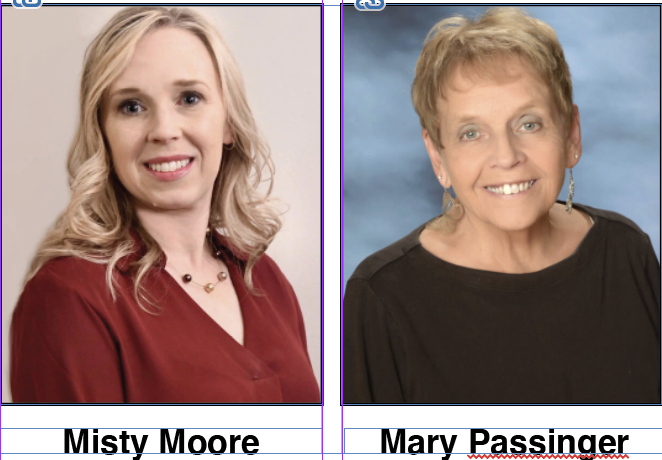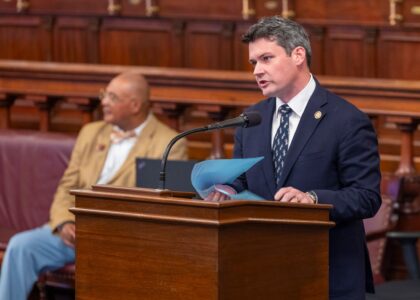School District Region 3 candidates debate issues

Residents of Region 3 in the Warren County School District can choose between two diametrically opposing candidates for the school board – challenger Misty Moore and incumbent Mary Passinger.
The candidate recently took part in a debate in Sugar Grove. Below are their answers to questions asked during the debate. A second story will appear in Thursday’s edition of the Times Observer.
Why are you running and what are your qualifications?
Passinger said she cares about education and the students in the Warren County School District. Passinger states that she has taught for over 30 years which gives her a unique perspective.
“I believe in public education, with all its strengths and weaknesses,” Passinger said. “I believe in what we do here in Warren County, although I acknowledge that it is not perfect and I want to continue in making it the best education we can offer. We need to find a way to publicize the positive elements which are prolific. I want to help turn around the negative opinions.”
Moore said while she is not a politician and has no personal gain or ties to staff or administration, she is a long time resident of Warren County, a taxpayer and a mother who is concerned about the direction that the district is heading.
“I am running for real representation for Region 3, the voice of the taxpayers, the parents and students,” Moore said.
The challenger said she has been active in community service projects throughout her time as a Warren County resident while bringing corporate experience as a licensed interior designer and an architectural engineer.. Moore said she has a combined experience of 23 years in the architectural field specializing in master planning facilities design, by working through acquisitions and corporate reorganization across the United States. Moore said she believes that her vast knowledge of facility design would be an asset to the district by bringing a unique perspective on the challenges and the infrastructure . She said that she will bring creativity while maintaining the budget and will see that everyone is treated equally.
WHAT DO YOU KNOW ABOUT THE SCHOOL BOARD’S BUDGET? WHAT PROPORTION IS SPENT ON TRANSPORTATION, TECHNOLOGY, ON FACILITIES, ON PERSONNEL COSTS INCLUDING PENSIONS AND OTHER EXPENSES? WHERE ARE BEST TO SAVE AND WHERE IS A NEED FOR GROWTH?
Moore said the district’s budget is a challenge and needs to be reassessed by having more transparency for the general public. Just more than 50% of the $94 million budget is spent on education, she said, with the rest spent on administration, facilities and transportation, miscellaneous that can’t be categorized and large sums of debt. She believes that finding places for funds to be reallocated is challenging due to the declining population for several years.
“Our student body has decreased while administration continues to increase. We see a new administration was voted in even this year even after closing two high schools and consolidating,” Moore said. “An entire building was closed, yet they increased the budget by $2 million. I looked at other districts that are of similar demographic and similar size.”
More said she would reach out to those districts to discuss and see what successful avenues they’ve attained with hopes of modeling after them.
Passinger said detailed spending in the budget. The total budget is $93.7 million, she said, with salaries totaling $33.7 million and benefits totaling $25.5 million – or 63% of the budget. Transportation costs $6.7 million, or 7% of the budget, but $3.7 is given back in subsidy from the state. Facilities are $1.8 million and technology costs are $1.3 million, which includes computers and software. Passinger said that by consolidating, more classes are added to benefit all of the district’s students. She mentioned that equitable education should mean all students are getting a comparable education.
“As unpopular as the reconfiguration of the district is, it is actually working toward the very idea of equitable education. When we have four different high schools and a huge difference in class size, some schools were able to carry way more courses than other schools. They simply weren’t available, they didn’t have the teachers to teach them,” Passinger said.
WHAT CHANGES WILL YOU PROPOSE TO PROTECT TEACHERS FROM STUDENT VIOLENCE AND TO PROTECT STUDENTS FROM THE CONSTANT DISRUPTION IN THEIR CLASSROOMS FROM DISRUPTIVE STUDENTS?
Moore said everyone is affected by student violence and disruptions in classrooms, saying there needs to be a stricter policy on discipline since students are not held accountable due to several various reasons and some are excused from their behavior.
“They’re going to have to learn at some point that as an adult, there are consequences, and I think teaching that at a younger age would help everyone involved. It would benefit those being disruptive as well as their classmates and teachers, but I think it begins with our administration and a stricter disciplinary policy that is actually followed through on,” Moore said.
Passinger’s response was that she agrees that teachers should be protected from injury.
“I do know that the superintendent this year had put forth a public video, saying that they were going to start cracking down on discipline,” Passinger said.
She went on to say that the state mandates the protocol, and it is something that needs to be approached on the state level because the district is limited on what they can do.
HOW DO YOU FEEL ABOUT THE AMOUNT OF TIME THAT STUDENTS ARE SPENDING ON BUSES IN BOTH MORNINGS AND AFTERNOONS? SOME OF THESE KIDS PLAY SPORTS AND DON’T GET HOME UNTIL DARK.
Moore said the amount of time students spend on buses is not beneficial at all and isn’t an equitable education. She had an example that many students from Youngsville arrive at 7:15 a.m. and includes students in kindergarten through 12th grades who are sitting for 45 minutes waiting for the school day to begin. Children are giving up a lot of time and then also sitting there until 3:45 in the afternoon until they board their bus home. Moore noted how some students have to take five buses per day to get to their final school. There needs to be a better way with not having students arrive home so late. When students are involved with sports, they are getting home very late and may still have homework.
“We’re kinda failing the students with the decisions being made,” Moore said.
Passinger’s response was that the district is continually trying to refine the bus issue.
“It’s tough for me because I understand it’s not an easy thing, but my children got on the bus at 10 after 7 and got to school at like 10 or 8,” Passinger said. “I mean it was a 40 minute drive at least, maybe more. They got home at 20 after 4. I’m not making light, I do understand it’s a problem.”
Passinger said that things have not changed that much, as far as getting home from sporting events late at night.
WE ARE NOW ON THE SECOND IN A ROW, SUPERINTENDENT WHO IS HIRED WITH NO PRIOR EXPERIENCE AND NO DOCTORATE. SHOULDN’T THE BOARD SET A HIGHER STANDARD FOR THE EDUCATIONAL LEADER OF THE DISTRICT?
Passinger again pointed out the teacher shortage and that only four people in the state applied for the job.
“We cannot match what they can make in other districts,” Passinger said.
She said that some would be taking a $100,000 cut in pay if they moved here for the job. She agreed we need someone to have the most education to have better requirements but, “We are operating under constraints that we don’t control.”
Moore said the district should push to have more qualified people in leadership positions as well as be looking for school leaders who have new approaches and viewpoints.
“I do feel that we need to have a higher standard. I don’t know how you expect the district to improve our education better if we are accepting sub-par,” Moore said. “And I’m not saying that the two of them aren’t wonderful people and well educated and all of that, but the other thing is that we need to quit pulling within our broken system. We basically have just raised people up position to position. By pulling someone from outside, we bring a new set of views, a different set of education, different experience, and with a higher education hopefully a better perspective on where we need to be. We’re never going to improve if we continue to keep the same people and the same cycle.”






